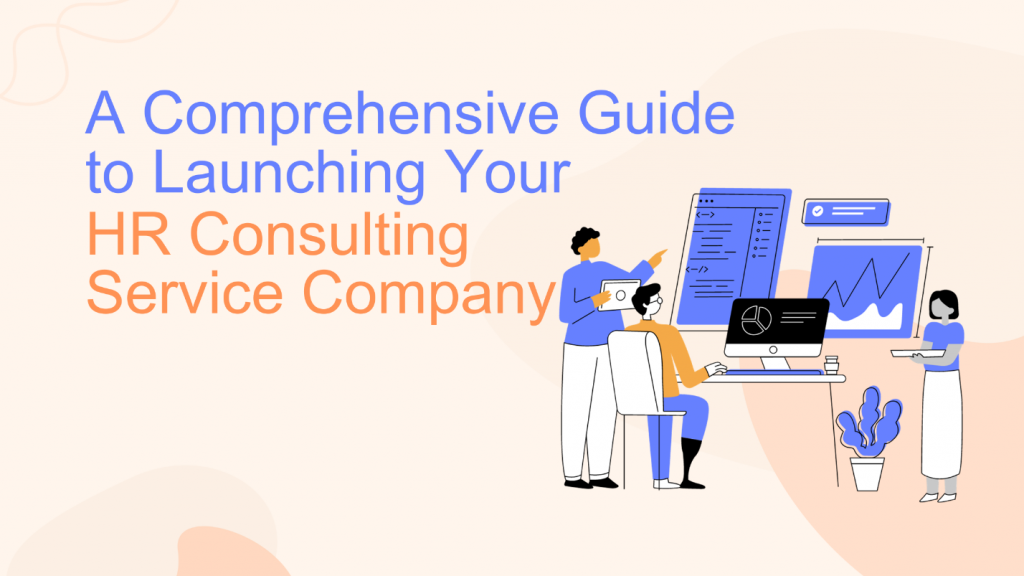A Comprehensive Guide to Launching Your HR Consulting Service Company

Starting your own HR (Human Resources) consulting service company can be a rewarding venture, providing you with the opportunity to leverage your expertise and experience in human resources to assist other businesses. However, like any entrepreneurial endeavor, it requires careful planning and execution. In this article, we’ll walk you through the essential steps to launch your HR consulting service, with a special focus on setting up a reliable system for accepting payments.
Steps to Launching an HR Consulting Company
You can launch your HR Consulting Company in eight easy steps!
1. Define Your Niche and Services:
Defining your niche and services is a crucial step in establishing a successful HR consulting business. While the specific services offered may vary based on the consultant’s expertise and the needs of their target market, here are some common services that an HR consulting business might provide:
- Recruitment and staffing solutions. This could include creating job descriptions, screening and evaluating candidates, and holding interviews.
- Employee training options. This may include reviewing and evaluating current training processes, designing and implementing training programs, or providing leadership development courses and consulting proposal examples.
- HR compliance and legal support: This could entail ensuring compliance with labor laws and regulations, managing workplace investigations, and creating or reviewing employee handbooks.
- Employee relations optimization. This might include tasks like providing mediation services, or even an exit interview and analysis.
- Outplacement services and training. Popular amongst schools and other businesses with an educational component to them, these could include job search services, resume writing and interview coaching, as well as networking assistance.
- Compensation and benefits consulting services. Popular services include designing incentive and bonus programs, or even providing payroll support and analysis.
- HR SaaS (software as a service) where your company provides some sort of HR software for businesses to use. That’s the route we took at Viveve.
Review our Human Resources Specialist description for more ideas.
When defining your niche, consider specializing in one or more of these services to differentiate yourself in the market. Or better yet, offer all these services, but customize your HR solutions around client needs. For example, you might focus exclusively on recruitment for a specific industry, become known for your expertise in HR technology implementation, or position yourself as a go-to consultant for compliance and legal initiatives.
Tailoring your services to address a specific need or industry can help you stand out and attract the right clients.
A client engagement is in an ongoing, personalized relationship with a company, while a customer is often involved in a more transactional interaction.
2. Create a Business Plan:
Crafting a detailed business plan is crucial for outlining your company’s mission, vision, target market, and financial projections. This plan will serve as a roadmap for your business and can be valuable when seeking funding or partnerships.
In crafting your business plan for your HR consulting service company, delve into the financial aspects and operational details that will propel your venture toward success.
- Outline your revenue streams, considering the various services you’ll offer and their associated pricing structures.
- Establish a realistic budget that encompasses initial startup costs and cost to develop an app, ongoing operational expenses, and a contingency fund for unforeseen challenges.
- Define your target market clearly, identifying industries and businesses that align with your expertise and services.
- Conduct a thorough competitive analysis to understand your competitors’ strengths and weaknesses, enabling you to position your HR consulting business strategically.
- Outline your marketing and sales strategies, detailing how you’ll promote your services, attract clients, and nurture long-term relationships.
A well-crafted business plan not only serves as a roadmap but also provides a foundation for potential investors or partners who may be interested in supporting your HR consulting venture.
3. Legal Considerations:
Register your HR consulting service as a legal entity and ensure compliance with local regulations. Consult with local legal representation to understand the necessary licenses, permits, contracts required for your business, and operations. You’ll likely need to file your business with your state.
4. Build a Strong Online Presence:
Create an informative website, and design a user-friendly experience that highlights your services, expertise, and client testimonials. Utilize search engine optimization (SEO) techniques to enhance your online visibility and attract potential clients searching for HR consulting services. Develop compelling content, including case studies and client testimonials, showcasing your expertise and success stories. Maintain a blog or resource section to position your company as an industry authority.
Building a robust online presence is vital for the success of your HR consulting company, and this starts with an effective website. Design a professional, user-friendly interface that reflects your brand identity. 57% of consumers won’t recommend a business that has a bad website mobile display. Ensure clear navigation, mobile responsiveness, and strategically placed call-to-action elements to facilitate easy access to information and encourage client inquiries.

5. Set Up a System for Accepting Payments:
One critical aspect of launching any business is establishing a reliable payment system. For an HR consulting service, it’s essential to offer convenient methods for clients to pay for your services. Implementing digital invoices and facilitating card-not-present transactions that can run online can significantly streamline the payment process. Having a simple payment process is a must to ensure a good customer experience.

Card-Not-Present Transactions:
Given the nature of consulting services, where transactions often occur remotely, having a secure system for card-not-present transactions is crucial. Partner with a reliable payment processor that not only offers secure online payment options, but also provides tips and solutions on how to optimize card-not-present transactions. Upholding PCI compliance guidelines when handing customer information, and adding an address verification software, are two ways to safeguard both your clients’ financial information and your business reputation.
Digital Invoices:
Invest in a reputable invoicing software that allows you to create and send professional digital invoices. This not only adds a level of professionalism to your business but also ensures accurate and timely payments. Look for features such as customizable templates, automated reminders, and secure payment gateways. Being able to send and track digital invoices will be a major convenience for you and your customers. Make getting paid easy.
6. Develop a Marketing Strategy:
To establish a robust marketing strategy, it’s imperative to craft a professional website to start. Your website acts as a central hub, providing comprehensive information about your products or services. Simultaneously, active engagement on social media allows you to connect with a broader audience, showcasing your brand’s personality and creating a dynamic online presence. Leverage social media platforms, with a particular emphasis on LinkedIn for B2B (business to business) engagement in the HR consulting realm. Consistently brand your profiles, share diverse content, and encourage interaction through questions, polls, and prompt responses to comments. Optimize your LinkedIn profile, actively engage with industry professionals, and utilize relevant hashtags to enhance visibility. Social media isn’t going away any time soon. 4.9 billion people use social media across the world.
Employ SaaS content writing strategies, such as informative blog posts and engaging visuals, to bolster credibility and position your business as an authority in the industry. Employ analytics tools to track social media performance, adjust your strategy based on insights. Consider paid advertising, and foster employee advocacy to amplify your reach. By implementing these best practices, your HR consulting company can effectively connect with your target audience, establish credibility, and thrive in the competitive digital landscape.
Complementing your digital efforts, active participation in networking events, AI calls and forming strategic partnerships can significantly enhance your marketing reach. Attend industry-specific gatherings to connect with potential clients, collaborators, and professionals. These interactions not only expand your network but also provide opportunities for valuable collaborations and client acquisitions. By weaving these elements into a cohesive marketing strategy, you can effectively communicate your brand’s message, build trust, and attract your target audience. This comprehensive approach ensures that your marketing efforts go beyond visibility, aligning with your business objectives for sustained success.
7. Client Relationship Management (CRM) System:
Implement a CRM system to manage client interactions, track leads, and streamline communication. This will help you stay organized and provide better customer service .A good CRM system can help you build meaningful, long-term relationships with your clients through effective relationship marketing, ensuring that you meet their needs and anticipate and exceed their expectations.
Implementing a CRM system for your HR consulting business is a strategic decision with multifaceted benefits. A CRM system can:
- Centralize and organize crucial client information
- Foster a more efficient and streamlined approach to managing relationships
- Track client interactions
- Monitor project progress
- Store essential customer details
- Facilitate personalized and informed communication with clients
With a comprehensive view of client histories and preferences, you can provide more tailored HR consulting services, strengthening client satisfaction and loyalty.
Additionally, a CRM system enhances collaboration among team members, ensuring everyone is on the same page regarding client engagements. As your business grows, the CRM becomes an invaluable tool for scaling operations, optimizing workflow, and ultimately contributing to the overall success and sustainability of your HR consulting venture. As your business grows, effective CRM implementation becomes an invaluable tool for scaling operations, optimizing workflow, and ultimately contributing to the overall success and sustainability of your HR consulting venture. As your business grows, effective CRM implementation through Odoo integration services becomes an invaluable tool for scaling operations, optimizing workflow, and ultimately contributing to the overall success and sustainability of your HR consulting venture.
8. Continuous Learning and Adaptation:
You, more than anyone, should know just how fast the HR field changes. Stay updated on industry trends, regulations, and best practices within the HR consulting field. Continuous learning will not only enhance your expertise but also help you adapt your services to evolving client needs.
You can start this journey by reading our other HR articles.

Conclusion:
Launching your own HR consulting service company requires a blend of industry knowledge, business acumen, and strategic planning. By following these steps and paying special attention to your payment system setup, you’ll be well-positioned for success in this dynamic and rewarding industry.